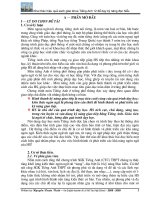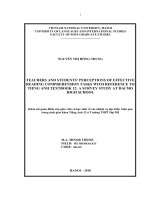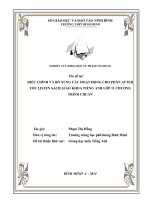Sách giáo khoa tiếng anh 12 phần 12
Bạn đang xem bản rút gọn của tài liệu. Xem và tải ngay bản đầy đủ của tài liệu tại đây (781.85 KB, 10 trang )
A. SPEAKING
Task 1. Work in pairs. Complete the following conversation and
practise reading it.
Conversation 1
A: What
?
B: Well, I like reading all sorts of books. Short stories, science fiction,
romance, everything.
A: How
?
B: Well, I often read through the book quickly first. Then I start reading
it again, and this time very slowly to enjoy every detail of it.
A: When
?
B: I read books whenever I have a little free time. I also read while
waiting for the bus or during the break at school.
Task 2. Work in pairs. Ask and answer about each other’s reading
habits, using the questions in the conversation.
Task 3. Work in pairs. Complete the following conversation and
practise reading it.
Conversation 2
A: What
?
B: At the moment? Well, I’m reading “The Chamber of Secrets”,
one of Harry Potter books.
A: Who
?
B: The main character? A young boy, Harry Potter, whose parents are
dead and who is trained to be a wizard in a wizard school.
A: What
?
B: He is brave, witty and very kind to other people.
Task 4. Work in pairs. Ask and answer about the book you are reading
or you have read. Note down the answers.
Task 5. Work in groups. Report the results to the group.
B. LISTENING
Before you listen
●
●
Work in pairs. Your partner has just read an interesting book.
What questions do you ask him/her to find out as much as possible
about the book?
Listen and repeat.
incredible
wilderness
journey
personality
fascinating
survive
unnoticed
reunited
While you listen
Listen to a woman talking about the book that she has just read and
do the tasks that follow.
Task 1. Circle the correct answer A, B or C.
1. The title of the book is
A. Canadian Wilderness
B. The Incredible Journey
C. Sheila Burnford
2. The book is about
A. a Canadian family
B. three Canadian friends
C. three animal friends
.
.
3. Where does the Canadian family go?
A. To visit a friend who lives 300 miles away.
B. To England.
C. To the Canadian wilderness.
4. Why do the animals leave the friend’s house?
A. They want to find their owners.
B. They want to know how to survive life in the wilderness.
C. They were not well treated by the friend.
5. What is the central theme of the book?
A. How the animals can survive life in the wilderness in order to get
home.
B. How to resolve an animal problem.
C. How to take care of other people.
Task 2. Listen again and fill in the gaps in the passage.
Each animal has a distinct personality, but they care for one another
almost as if they were a (1) __________. The most impressive of
them is the old dog. The journey was the most difficult for him, but
amazingly he found the (2) _________ to make it.
The author didn’t try to turn the animals into people, speaking and
acting like (3) ___________. Instead, she was faithful to her
characters as animals and showed us their (4) ___________ through
animal eyes. That made the book interesting and unbelievable.
I would recommend the book to anyone who likes animals. I think
that anyone who has ever had a (5) __________ or wanted one would
enjoy it.
After you listen
Work in pairs. Ask and answer the question: Would you like to read
the book or wouldn’t you? Why/Why not?
D. WRITING
Writing a book report
Task 1. Below are questions you have to answer when writing a report
on a book, but they are jumbled. Work with a partner. Put the
questions under the correct headings.
Questions to be answered
1. What was your opinion of the book?
2. Where is the book set?
3. Would you recommend the book?
4. Who is the author?
5. What is the main theme of the story?
6. Who are the main characters?
7. What is the title of the book?
8. What is the plot of the story?
9. What type of book is it?
HEADINGS
General introduction
...............................................................................................................
...............................................................................................................
...............................................................................................................
Summary of the book’s content
...............................................................................................................
...............................................................................................................
...............................................................................................................
Conclusion
...............................................................................................................
...............................................................................................................
...............................................................................................................
...............................................................................................................
Task 2. Work in pairs. Ask and answer the above questions about a
book you have just read.
Task 3. Write a report on the book you have read recently based on the
results of Tasks 1 and 2.
E. LANGUAGE FOCUS
Pronunciation
●
●
● Pronunciation:
Rhythm
Listen and practise reading the following sentences, paying attention
● Grammar: Modals in the passive voice
to the stressed syllables.
1. Why did you behave like that?
2. Come for a swim.
3. I think it will be fine.
4. She’s gone for a walk in the park.
5. I wonder if he’ll ever come back.
Mark the primary stress over the main stress syllables, then
practise reading the sentences.
Peter’s coming in a minute if he can.
Come and see us at our new apartment.
Where’s your new apartment? Is it in another district?
Why was he trying to embarrass me?
Probably he wanted you to notice him.
Grammar
Exercise 1. Rewrite the sentences in the passive.
1 . You mustn't use this machine after 5.30 p.m.
.
2. You must clean this machine every time you use it.
.
3. You should keep the flowers in a warm sunny place.
.
4. You should pay your bill before you leave the hotel.
.
5 . You should give us the information now.
.
6. You can buy toothpaste at the drug store.
.
7. We should warn the children not to speak to strangers.
.
8. Nobody can solve the mystery.
.
9. You can exchange travellers' cheques at most banks.
.
10. You shouldn't tell her the news. It might kill her.
.
Exercise 2. Following is a conversation between two characters in a
science fiction about space travel. Complete it with the suitable
passive form of the verbs in brackets.
Naomi: Dr. Kay, I’d like to ask how meals (1. will/prepare)
in the Space Station.
food (2. be going
to/cook)
on board or taken in the form of tablets?
Dr. Kay: Neither. Gourmet meals (3. will/pre-package)
on Earth then they (4. can/warm up)
on board.
Naomi: But the tourists will be from different parts of the world. How
food (5. should/choose)
to suit
everyone’s taste?
Dr. Kay:An international menu (6. have to/offer)
.
Food (7. could/select)
from food preference
forms that tourists completed before the trip. And meals
(8. ought to/make)
as pleasant as possible.
Unit
12
WATER SPORTS
A. READING
Before you read
Work in pairs. Look at the picture and answer the questions.
1. Can you name the sport in the picture?
2. Where is it played?
3. How do people play it?
While you read
Read the passage and do the tasks that follow.
Water polo is played in a pool 1.8 metres deep, 30 metres long and 20
metres wide, with a goal 3 metres high and at least 0.9 metre above
the water. The goal is marked by vertical posts, a crossbar and a net.
There are seven players per team, six swimmers and a goalie. The
home team wears white caps, the visiting team blue ones and the
goalies wear red caps with the number 1 in white.
Like football, the game begins with the ball in the centre of the pool
and both teams sprint for it from their own goal lines. The ball can be
advanced by passing with one hand or swimming with the head above
the water and the ball between the arms so it rides on the wave
created by the swimmer’s head. No player except the goalie can hold
the ball with both hands.
Defensive players are not allowed to interfere with the opponent’s
movements unless the player is holding the ball. Major fouls are
penalized by one minute in the penalty box and a player is ejected
after committing five personal fouls.
For minor fouls, such as holding or punching the ball, a free throw is
awarded from the spot of the foul. At least two players must touch the
ball after a free throw before a goal can be scored.
A game is divided into quarters ranging from five to eight minutes in
length. After a tie, there are two overtime periods of three minutes
each. If the game is still tied after the overtime periods, two teams
continue to play 3-minute overtime until the referee’s decision is
made.
Task 1. Work in pairs. Match the words in column A with their
meanings in column B.
A
1. opponent
2. penalize
3. eject
4. foul
5. tie
B
a. to make someone leave a game
b. an action in sports that is against the rules
c. to punish a team or player who breaks the rules
d. a situation in a game when two teams have the same
scores
e. someone who tries to defeat another person in a
competition
Task 2. Complete the following sentences, using the information from
the passage.
1. Water polo is played in a pool __________ metres deep,
long and
wide.
2. The home team wears
and the goalies wear
, the visiting team
.
3. Both teams sprint for the ball from
.
4. A free throw is awarded for minor fouls, such as
5. A game is divided into quarters ranging from
wears
.
in length.
Task 3. Work in pairs. Ask and answer the following questions.
1. Where can people play water polo?
2. Where is the ball when the game starts?
3. How can the ball be advanced?
4. Which players are allowed to hold the ball with both hands?
5. What happens to a player who commits five personal fouls?
After you read
Work in groups. Make a comparison between football and water polo,
using the following suggestions.
● places to play
● number of players
● main rules
● length of game
B. SPEAKING
Task 1. Work in pairs. Look at the pictures and match the names with the
appropriate water sports.
● scuba-diving
● windsurfing
● swimming
● rowing
● water polo
● synchronized swimming
Task 2. Work in pairs. Look at the table and talk about each of the water sports.
Place
Equipment
required
to play with
Number
of players/
participants
pool
ball
team
Rowing
sea, lake,
river
boat, oars
individually, team
Windsurfing
sea, lake
board, sail
individually
Scubadiving
sea
air tank, regulator,
wet suit, mask, fins
pairs, team
Type of
sport
Water polo
Example:
Water polo is played in a pool. It is played with a ball and people play it in a team









